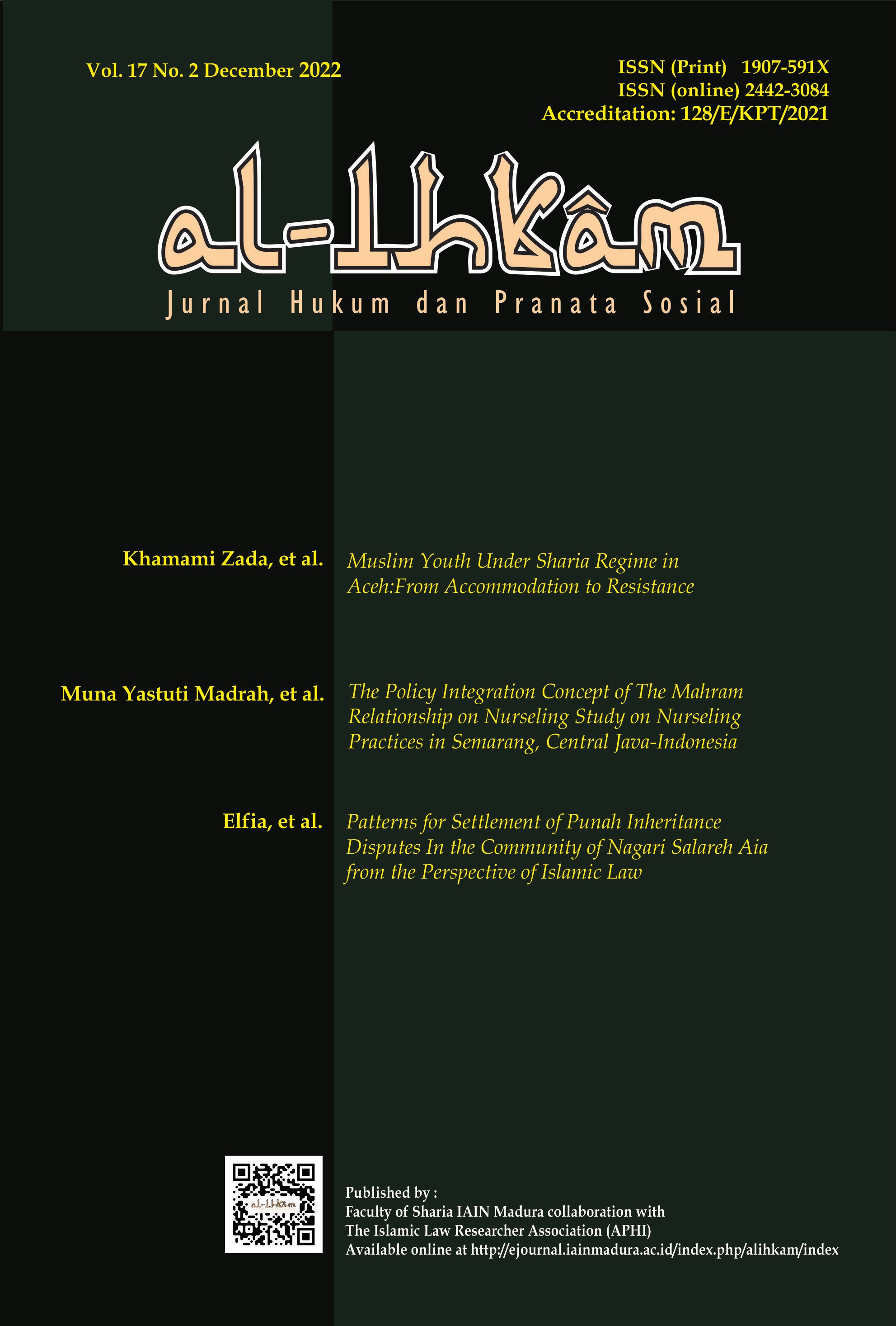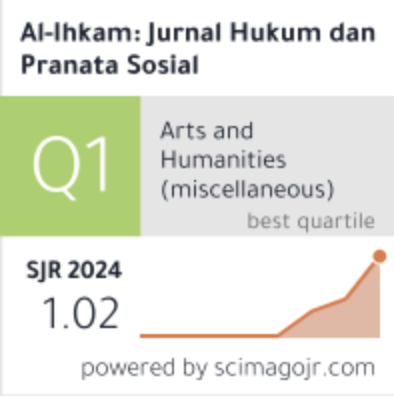The Policy Integration Concept of The Mahram Relationship on Nurseling Study on Nurseling Practices in Semarang, Central Java-Indonesia
 Abstract views: 781
,
Abstract views: 781
,
 PDF downloads: 688
PDF downloads: 688
Abstract
Giving breast milk is becoming more popular, whether directly or mediated by organizations supporting nursing donors. In Muslim communities, donating breast milk has implications for the relationship between the child and the nursing mother, including the mother's husband and biological children. The relationship is called the mahram relationship. Mahram in Islam is essential because it clarifies the child's lineage and the relationship between the family of the nursing mother. The objectives of this study are 1). to describe the breastfeeding donor in Semarang; 2). to describe community awareness of its implication; and 3). questions whether any policy regulates the recording of breastfeeding donor practices to track mahram relationships. This is qualitative research by exploring information from primary sources in Semarang District. Furthermore, the data, also, is gathered from relevant policy documents to strengthen argumentation and analysis. The results indicate that breastfeeding donor policies already exist in Semarang, but each institution associated with various policies moves independently in its implementation. There is no policy regarding recording the mahram relations. The absence of a clear and integrated policy has led to a tendency for people to practice breastfeeding independently without the need to carry out official recording procedures. The research offers a cross-sectoral integrated policy concept aiming to fulfill children's rights to the best food in their early life while having the right to know the clarity of their lineage.
Downloads
References
Ade, Muhammad, Safri Salampessy, Lucitania Rizky, and Isna Achdyana. “The Effectiveness of The Convention on the Rights of the Child ( CRC ) Regime by UNICEF in Encouraging the Implementation of Child Protection in Southeast Asian Countries” 2, no. 1 (2022): 12–20.
Aini, Rifqial Hani. “Implementasi Donor Asi Pada Lembaga Lactashare Dan Kesesuaian Dengan Fatwa Mui Nomor 28 Tahun 2013 Tentang Donor Asi.” UIN Syarif Hidayatullah Jakarta, 2021.
Aminuddin, and Selamet Abidin. Fikih Munakahat 2. Bandung: Pustaka Setia, 1999.
Amruzi, Fahmi Al. “Nasab Anak Dari Perkawinan Siri.” Al-Adl : Jurnal Hukum 14, no. 1 (2022): 1. https://doi.org/10.31602/al-adl.v14i1.5834.
Anderson, J E. Public Policy-Making. Basic Concepts in Political Science. Holt, Rinehart, and Winston, 1984. https://books.google.co.id/books?id=F3VHAAAAMAAJ.
Aziz, Nasaiy, and Muksal Mina. “Nasab Anak Yang Lahir Di Luar Nikah: Analisis Fatwa MPU Aceh Nomor 18 Tahun 2015 Dan Keputusan MK Nomor 46/PUU/-VIII/2010.” Samarah 1, no. 1 (2017): 72–100. https://doi.org/10.22373/sjhk.v1i1.1571.
Badieah, Badieah, Ahmad Mujib, Muna Yastuti Madrah, Andi Riansyah, and Nur Muhammad. “Implementasi RESTful Web Service Pada Sistem Informasi Donor ASI Terintegrasi Di Indonesia Implementation of RESTful Web Service on Indonesian ’ s Integrated Breastfeeding Donor Information System.” SISTEMASI : Jurnal Sistem Informasi 11, no. 2 (2022): 455–69.
Baumer, J. Harry. “Guidelines for the Establishment and Operation of Human Milk Banks in the UK.” Archives of Disease in Childhood: Education and Practice Edition 89, no. 1 (2004). https://doi.org/10.1136/adc.2004.053330.
Bensaid, Benaouda. “Breastfeeding as a Fundamental Islamic Human Right.” Journal of Religion and Health 60, no. 1 (2021): 362–73. https://doi.org/10.1007/s10943-019-00835-5.
Candel, Jeroen J.L., and Robbert Biesbroek. “Toward a Processual Understanding of Policy Integration.” Policy Sciences 49, no. 3 (2016): 211–31. https://doi.org/10.1007/s11077-016-9248-y.
Daud, Normaidah, Nadhiroh Nordin, Zurita Yusoff, and Rahimah Embong. “The Development of Milk Bank According to Islamic Law for Preserving the Progeny of Baby.” In Contemporary Issues and Development in The Global Halal Industry, edited by Siti Khadijah Abdul Manan, Fadilah Abd. Rahman, and Mardhiyyah Sahri. Springer, 2016. https://doi.org/10.1007/978-981-10-1452-9.
Desrikanti, BK. “Konsep Al-Radha’ah Dan Hukum Operasional Bank ASI Menurut Pandangan Ulama Empat Mazhab.” UIN Alauddin, 2014.
Dewi, A., A. Suparwati, and C. Suryawati. “Analisis Implementasi Kebijakan Asi Eksklusif Di Tingkat Kabupaten Kebumen Tahun 2013.” Jurnal Kesehatan Masyarakat (e-Journal) 2, no. 1 (2014): 22–27.
“FGD Dengan Ibu Pendonor ASI Juni 2021.” n.d.
Fikriyah, Khusnul. “Pendapat Madzhab Hanafi Dan Syafi’I Tentang Jual Beli Asi Perspektif Al-Mashlahah Al-Mursalah.” Maliyah 07, no. 01 (2017): 172–201.
Fitri, Anissa Nur, Agus Wahyudi Riana, and Muhammad Fedryansyah. “Perlindungan Hak-Hak Anak Dalam Upaya Peningkatan Kesejahteraan Anak.” In Prosiding Penelitian Dan Pengabdian Kepada Masyarakat, 2:45–50, 2015. https://doi.org/10.24198/jppm.v2i1.13235.
Halim, Abdul. “Donor Asi Dalam Perspektif Hukum Islam.” Miyah: Journal of Islamic Studies 12, no. 2 (2013): 1–18.
Hartmann, B. T., W. W. Pang, A. D. Keil, P. E. Hartmann, and K. Simmer. “Best Practice Guidelines for the Operation of a Donor Human Milk Bank in an Australian NICU.” Early Human Development 83, no. 10 (2007): 667–73. https://doi.org/10.1016/j.earlhumdev.2007.07.012.
Hasan, M. Ali. Pedoman Hidup Berumah Tangga Dalam Islam. Jakarta: Siraja, 2003.
Hilman, Tamadara, and Adjane Annisawati Asaretkha. “Persepsi Para Ibu Terhadap Sikap Donor Asi Di Bandung.” Jurnal Ekonomi Dan Bisnis 8, no. 1 (2021): 141–46.
Intifada, Silma, and Ari Subowo. “Implementasi Peraturan Walikota Semarang Nomor 7 Tahun 2013 Tentang Peningkatan Pemberian ASI Eksklusif.” Journal of Public Policy and Management Review 6, no. 2 (2017). https://ejournal3.undip.ac.id/index.php/jppmr/article/view/15998%0Ahttps://ejournal3.undip.ac.id/index.php/jppmr/article/viewFile/15998/15451.
Irwansyah, Dedi. “Praktik Donor ASI Di Asosiasi Ibu Menyusiu Indonesia (AIMI) Dalam Perspektif Hukum Islam.” UIN Syarif Hidayatullah, 2011.
Kaime, Thoko. “The Convention on the Rights of the Child and the Cultural Legitimacy of Children’s Rights in Africa : Some Reflections.” African Human Rights Law Jurnal 5, no. 2 (2005).
Koçtürk, T. “Foetal Development and Breastfeeding in Early Texts of the Islamic Tradition.” Acta Paediatrica 92, no. 5 (2003): 617–20.
“Kompilasi Wawancara Dengan Keluarga Penerima Donor ASI Juni 2020,” n.d.
Lactashare. “How Indonesia Human Milk Bank Works.” Lactashare Foundation, 2020.
Martati, Eli, and Firdaus Firdaus. “Hak Hadhanah Dalam Putusan Pengadilan Agama.” JURIS (Jurnal Ilmiah Syariah) 17, no. 2 (December 31, 2018): 233. https://doi.org/10.31958/JURIS.V17I2.1195.
Meijers, Evert, and Dominic Stead. “Policy Integration : What Does It Mean and How Can It Be Achieved ? A Multi-Disciplinary Review.” In 2004 Berlin Confrerence on the Human Dimensions of Global Environment Change: Greening of Policies - Interlinkages and Policy Integration, Berlin, 1–15, 2004.
Mia, Sutanto, Astri Pramarini, and Sari Kailaku. “Donor ASI : Membantu vs Bumerang Bagi Ibu Menyusui.” Asosiasi Ibu Menyusui Indonesia, 2017. https://aimi-asi.org/layanan/lihat/donor-asi-membantu-vs-bumerang-bagi-ibu-menyusui.
MUI. Fatwa Majelis Ulama Indonesia No. 28 Tahun 2013 tentang Seputar Masalah Donor Air Susus Ibu (Istirdla’) (2013).
Mun’im, Ahmad. “Intensitas Penyusuan Dalam Larangan Perkawinan Sesusuan (Analisis Pasal 39 Ayat 3 Kompilasi Hukum Islam).” Al-Ahwal: Jurnal Hukum Keluarga Islam 9, no. 2 (2017): 229. https://doi.org/10.14421/ahwal.2016.09208.
Peraturan Pemerintah Republik Indonesia No. 33 tahun 2012 tentang Pemberian Air Susu Ibu Eksklusif (2012).
Perwira, Mohammad Yudha, and Tities Eka Agustine. “Desain Layanan Publik Terintegrasi Di Daerah Melalui Whole Government Approach: Praktik Di Surabaya, Pontianak Dan Denpasar.” Komite Pemantauan Pelaksanaan Otonomi Daerah 53, no. 9 (2017): 1689–99. https://www.researchgate.net/publication/329983428_Desain_Layanan_Publlik_Terintegrasi_di_Daerah_Melalui_Whole_Government_Approach_Praktik_di_Surabaya_Pontianak_dan_Denpasar.
Prameswari, Zendy Wulan Ayu Widhi. “Ratifikasi Konvensi Tentang Hak-Hak Anak Dalam Sistem Peraturan Perundang-Undangan Di Indonesia.” Yuridika 32, no. 1 (2017): 167. https://doi.org/10.20473/ydk.v32i1.4842.
Rayner, Jeremy, and Michael Howlett. “Introduction: Understanding Integrated Policy Strategies and Their Evolution.” Policy and Society 28, no. 2 (2009): 99–109. https://doi.org/10.1016/j.polsoc.2009.05.001.
Reynaert, Didier, Maria Bouverne-De Bie, and Stijn Vandevelde. “A Review of Children’s Rights Literature since the Adoption of the United Nations Convention on the Rights of the Child.” Childhood 16, no. 4 (2009): 518–34. https://doi.org/10.1177/0907568209344270.
Rother, Edna Terezinha. “Systematic Literature Review X Narrative Review.” Acta Paulista de Enfermagem 20 (2007): v--vi.
Aminuddin, and Selamet Abidin. Fikih Munakahat 2. Bandung: Pustaka Setia, 1999.
Badieah, Badieah, Ahmad Mujib, Muna Yastuti Madrah, Andi Riansyah, and Nur Muhammad. “Implementasi RESTful Web Service Pada Sistem Informasi Donor ASI Terintegrasi Di Indonesia Implementation of RESTful Web Service on Indonesian ’ s Integrated Breastfeeding Donor Information System.” SISTEMASI : Jurnal Sistem Informasi 11, no. 2 (2022): 455–69.
“FGD Dengan Ibu Pendonor ASI Juni 2021.” n.d.
Hasan, M. Ali. Pedoman Hidup Berumah Tangga Dalam Islam. Jakarta: Siraja, 2003.
Irwansyah, Dedi. “Praktik Donor ASI Di Asosiasi Ibu Menyusiu Indonesia (AIMI) Dalam Perspektif Hukum Islam.” UIN Syarif Hidayatullah, 2011.
“Kompilasi Wawancara Dengan Keluarga Penerima Donor ASI Juni 2020,” n.d.
Lactashare. “How Indonesia Human Milk Bank Works.” Lactashare Foundation, 2020.
Martati, Eli, and Firdaus Firdaus. “HAK HADHANAH DALAM PUTUSAN PENGADILAN AGAMA.” JURIS (Jurnal Ilmiah Syariah) 17, no. 2 (December 31, 2018): 233. https://doi.org/10.31958/JURIS.V17I2.1195.
MUI. Fatwa Majelis Ulama Indonesia No. 28 Tahun 2013 tentang Seputar Masalah Donor Air Susus Ibu (Istirdla’) (2013).
Mun’im, Ahmad. “Intensitas Penyusuan Dalam Larangan Perkawinan Sesusuan (Analisis Pasal 39 Ayat 3 Kompilasi Hukum Islam).” Al-Ahwal: Jurnal Hukum Keluarga Islam 9, no. 2 (2017): 229. https://doi.org/10.14421/ahwal.2016.09208.
Peraturan Pemerintah Republik Indonesia No. 33 tahun 2012 tentang Pemberian Air Susu Ibu Eksklusif (2012).
Safir, Halimatus Saadiah Mohamad, Dhamirah Nursakinah Mohamad Safir, and Siti Fatimah Salleh. “REALITI PENYUSUAN ANAK SUSUAN PADA ZAMAN SILAM DAN KONTEMPORARI.” AL-QIYAM International Social Science and Humanities Journal 2, no. 2 (2019): 48–56.
Saifuddin Zuhri Purwokerto, Uin KH. “Position of Fatwa in Islamic Law: The Effectiveness of MUI, NU, and Muhammadiyah Fatwas.” Ijtihad : Jurnal Wacana Hukum Islam Dan Kemanusiaan 22, no. 1 (July 29, 2022): 53–72. https://doi.org/10.18326/ijtihad.v22i1.53-71.
Safir, Halimatus Saadiah Mohamad, Dhamirah Nursakinah Mohamad Safir, and Siti Fatimah Salleh. “Realiti Penyusuan Anak Susuan Pada Zaman Silam Dan Kontemporari.” Al-Qiyam International Social Science and Humanities Journal 2, no. 2 (2019): 48–56.
Spatz, Diane L., Riccardo Davanzo, Janis A. Müller, Rebecca Powell, Virginie Rigourd, Ann Yates, Donna T. Geddes, Johannes B. van Goudoever, and Lars Bode. “Promoting and Protecting Human Milk and Breastfeeding in a COVID-19 World.” Frontiers in Pediatrics 8, no. February (2021): 1–6. https://doi.org/10.3389/fped.2020.633700.
Sukmasari, Radian Nyi. “Menyoal Praktik Donor ASI Di Indonesia.” Detik Health, 2016. https://health.detik.com/ulasan-khas/d-3267167/menyoal-praktik-donor-asi-di-indonesia.
UNICEF. Convention on the Rights of the Child (1989).
Vega, Connie La, Kokeb Zeleke, and Esther Wilch. “The Promotion of Economic, Social, and Cultural Rights of Vulnerable Groups in Africa Persuant to Treaty Obligations: CRC, CEDAW,CERD & CRPD.” Global Studies Law Review 2, no. 14 (2015): 213–41.
Vivero Pol, Jose Luis, and Claudio Schuftan. “No Right to Food and Nutrition in the SDGs: Mistake or Success?” BMJ Global Health 1, no. 1 (2016): 1–5. https://doi.org/10.1136/bmjgh-2016-000040.
“Wawancara Dengan Keluarga Penerima Donor ASI Di Kota Semarang.” 2021.
“Wawancara Dengan Kepala KUA Genuk Dan KUA Gayamsari, September 2021.” n.d.
Copyright (c) 2022 AL-IHKAM: Jurnal Hukum & Pranata Sosial

This work is licensed under a Creative Commons Attribution-ShareAlike 4.0 International License.
In order to be accepted and published by Al-Ihkam: Jurnal Hukum dan Pranata Sosial, author(s) submitting the article manuscript should complete all the review stages. By submitting the manuscript, the author(s) agreed to the following terms:
- The copyright of received articles shall be assigned to Al-Ihkam: Jurnal Hukum dan Pranata Sosial as the publisher of the journal. The intended copyright includes the right to publish articles in various forms (including reprints). Al-Ihkam: Jurnal Hukum dan Pranata Sosial maintain the publishing rights to the published articles.
- Authors are permitted to disseminate published articles by sharing the link/DOI of the article at Al-Ihkam: Jurnal Hukum dan Pranata Sosial. Authors are allowed to use their articles for any legal purposes deemed necessary without written permission from Al-Ihkam: Jurnal Hukum dan Pranata Sosial with an acknowledgment of initial publication to this journal.
- Users/public use of this website will be licensed to CC-BY-SA.



.png)
_1.png)


_page-00011.jpg)


